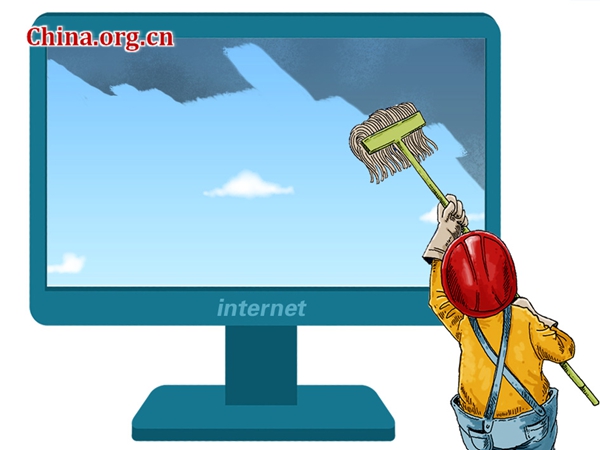Effort needed to clean up public discourse
- By Wan Lixin
 0 Comment(s)
0 Comment(s) Print
Print E-mail Shanghai Daily, May 19, 2016
E-mail Shanghai Daily, May 19, 2016
|
|
|
A spring-cleaning [By Zhai Haijun / China.org.cn] |
Early this month, a commentary in People's Daily expressed concern at the increasingly widespread use of online terms and slang phrases in the traditional mass media.
Some of these terms have even made their way into textbooks or dictionaries.
It wasn't that long ago that China's media regulator ordered the removal and revision of a popular series of videos by Papi Tyan for their use of rough and abusive language. These videos featured liberal use of words such as kao (fuck) and xiao biaozi (little bitch); among other colorful terms.
The growing permissiveness regarding foul language use is worrisome.
When I was young, kao was used mostly among street hooligans.
A few years ago, when I began to hear it from my primary-school-age son (he used a variation of the term, ke), it was no longer a term people made a fuss about.
Anyway, at that time it was already considered a mild expletive, one particularly favored by ladies of fashion.
Even national broadsheet newspapers, in an effort to avoid being seen as stodgy and out-of-touch, begin to sprinkle their articles with such terms as diaosi (literally "pubic hair," a self-deprecating term often used to describe young urbanites deemed "losers" by contemporary Chinese society).
Such terms might make an impact when first used, but soon their effect diminishes.
Some recent events have also inspired lax use of language.
Recently there has been a great stir in the media and online surrounding the case of a 29-year-old man in Beijing who died suddenly after being seized by police following his alleged visit to a massage parlor. Some have alleged that the man in question had gone to this establishment to da feiji ("shoot an aircraft," an euphemism for masturbation).
My hats off to our compatriots' zeal in their quest for justice and truth, but I wonder if some have become overly fixated on the seedier allegations involved in this case.
The speed with which online vulgarity can — and does — spread suggests, above all, a lack of effective supervision and guidance.
Cultural pollution is now a historical concept, and in our fervor to embrace the market credo and laissez faire philosophy, the term "ideology" itself is often viewed with suspicion.
In an era when the Internet is perceived as progressive, democratic, state-of-the-art, and the future of nearly everything, any regulation must be attempted with caution, and constantly justified.
There is the view that regulation is unnecessary as online slang terms are typically short-lived and will die off on their own before anyone can crack down on them.
But as professor Zhang Yiwu from Beijing University observes, online words are part of the cultural life of the great masses — thus they do not exist independently of reality, and the vulgar use of the language should be subject to supervision and management.
Impressionable youth
And there should be a sense of urgency. While the argument can go on and on, some of these vulgar concepts threaten to take root, shaping our ideology and our way of thinking (for ideas cannot but be conceived of via the media of language). This is particularly a problem in the case of young people who are impressionable.
For instance, when tuhao resurfaced in our language a few years ago in reference to showy but tasteless nouveau riche, people of my age knew how tuhao (powerful landlords who bullied those beneath them) used to be object of suppression in the early 20th century.
But in the modern context, in the absence of these historical associations, to call somebody tuhao, or someone flamboyantly or obscenely rich, is merely stating a fact. Thus when I heard my son referring to one of his classmates, who is at the bottom of his class academically, as the son of a tuhao, I didn't know if this was already an honorific term among today's young people. At the very least, it appears to be an extenuating circumstance behind poor grades.
Semantic amelioration has been taking place all around us.
I do not know if there was a measure of irony when gao shuai fu ("tall, handsome, rich") was first coined, but today many young women see these three criteria as good guidelines when searching for a spouse.
I remembered how a decade ago one of my relatives working in a factory in Suzhou, Jiangsu Province, dreamed about one day being able to bang (tie up with) a dakuan (wealthy backer).
Our ambivalence toward vulgarity has helped create confusion and tolerance at a time when judgment and authority are needed.
The media should exercise caution regarding the use of newfangled words originating from online.
Given the lag in regulation, the best policy may be appealing to the online operators' sense of responsibility and morality.
At the same time, there is the need for more effective measures to promote correct and legal use of the national language, particularly among state organs, schools and news outlets.






